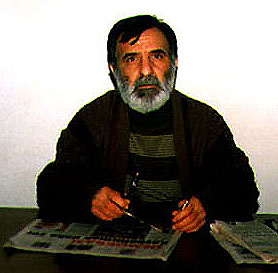The Committee to Protect Journalists is saddened by the death of Isik Yurtçu, who died Saturday in Istanbul of cancer at the age of 67.
In July of 1997, a bus full of international and Turkish journalists pulled up to the plain iron gate of Sakarya Prison east of Istanbul. Cameras rolling, representatives of CPJ, the International Press Institute, Reporters Sans Frontieres and Turkey’s Press Council and Union of Newspaper Editors pressed toward the startled guard who swung the gate open just a foot or two and peered out.
We had been promised a chance to talk with Isik Yurtçu, the Kurdish newspaper editor who had so far served two years of a 15-year sentence, with more charges pending against him. While he was convicted of publishing “separatist propaganda,” among other things, his conviction was really about articles in his paper reporting on the army’s harsh conduct in the conflict with Kurdish rebels in the eastern part of the country.
Yurtçu’s freedom had been the focus of a year-long campaign by the press freedom organizations, and our visit followed five days of meetings with the country’s president, prime minister, justice minister and others. All the newly confirmed government officials had vowed they would ensure his release, along with others of the 70 or so journalists in prison at the time.
The guard obviously hadn’t heard of that promise, and quickly called for more senior prison officials. The crowd didn’t wait, pushing the gate further open and pouring into the prison courtyard. After some moments of total confusion, several of us were ushered into a conference room, where guards brought Yurtçu to meet us. I presented him with CPJ’s International Press Freedom Award, which we had honored him with the previous year.
Pale but composed, the small, bearded man thanked us gracefully, then walked over to the window and held the plaque up, waving to the 100 or so cheering journalists below.
A few months later, I saw Yurtçu again–this time, buying him a glass of champagne in New York’s famous Rainbow Room, atop the NBC building. He had been released a month after our visit–the first sign of thawing in Turkey’s long regime of censorship and suppression of the press.
In his letter from prison to CPJ after hearing of his award, Yurtçu had written: “I’ve been in jail for two years just because I tried to learn the truth and relay this truth to inform the public – in other words, to do my job with the belief that it is impossible to have other freedoms in a country where there is no freedom of the press…
“What a pleasure to be able to dream about the day when peace, democracy, human rights, and freedom of expression and of the press will become a reality in my country. What a pleasure to see a light of hope despite the surrounding prison walls and the deep darkness here.”
Yurtçu had refused an opportunity to leave his country before his imprisonment. He had repeatedly refused a presidential pardon. “This is not about me,” he said. “This is about freedom for all the Turkish people.”
For me, his courage and integrity and stubbornness exemplified all the journalists I had encountered abroad, as a reporter and as a member of CPJ–people who well understood the importance of a free and active press; people who risked their lives and freedom every day just as Yurtçu did, to “learn the truth and relay this truth to the public.” His release from prison was both a triumph for CPJ and our colleagues at RSF and IPI, and a great personal satisfaction for me.
Unfortunately, while Yurtçu and Turkey enjoyed a few years of increasing civil rights, including a greater degree of freedom of the press, the country’s government has fallen back into old bad habits. Once again, dozens of journalists are in jail, and thousands of criminal cases have been filed against reporters, bringing endless legal proceedings and costs and chilling once again efforts to “learn and tell the truth.”
“A critical journalist in Turkey these days needs a lawyer on standby,” CPJ wrote recently. “The press is laboring under a creaking judicial system and a panoply of antiquated and vague legislation that officials and politicians of every stripe find irresistible as a weapon against muckraking reporters and critical commentators.”
Yurtçu believed deeply, as do I and my colleagues at CPJ, that “it is impossible to have other freedoms in a country where there is no freedom of the press.” Turkey has become much more successful economically since my visit to Yurtçu’s prison, and is now a strong regional power. Yet it still has not learned that vital lesson. Until it does, dedicated journalists like him will continue to risk their freedom and their lives to learn and tell the truth, and CPJ will do our best to help them.
